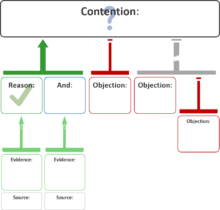A logical argument is a structured form of reasoning that presents a series of statements and claims, ultimately leading to a conclusion. In order to be effective, a logical argument must include several essential components.
First and foremost, a logical argument must have a clear and well-defined conclusion. This conclusion is the main point that the argument is trying to prove or establish. It should be specific and concise, and it should be stated early on in the argument so that the reader knows what the argument is trying to establish.
Secondly, a logical argument must include evidence to support the conclusion. This evidence can take many forms, such as facts, statistics, examples, or testimony from experts. It is important that this evidence is relevant to the conclusion and that it is presented in a logical and coherent manner.
Thirdly, a logical argument must have clear and logical reasoning connecting the evidence to the conclusion. This reasoning should be easy for the reader to follow and should be based on logical principles, such as the principle of cause and effect or the principle of non-contradiction.
Another essential component of a logical argument is the consideration of counterarguments. A logical argument should consider and address potential objections or alternative viewpoints, rather than simply ignoring them or dismissing them outright. This shows that the argument is well-rounded and that the conclusion is based on a thorough examination of all sides of the issue.
Finally, a logical argument should be well-organized and easy to follow. It should have a clear structure, with each point and piece of evidence building on the one before it. It should also be written in a clear and concise manner, using language that is easy for the reader to understand.
In conclusion, a logical argument must include a clear and well-defined conclusion, evidence to support the conclusion, logical reasoning connecting the evidence to the conclusion, consideration of counterarguments, and a clear and well-organized structure. By including these essential components, a logical argument can effectively present a well-reasoned and persuasive case for a particular conclusion.







.svg/400px-Argument_terminology_used_in_logic_(en).svg.png)